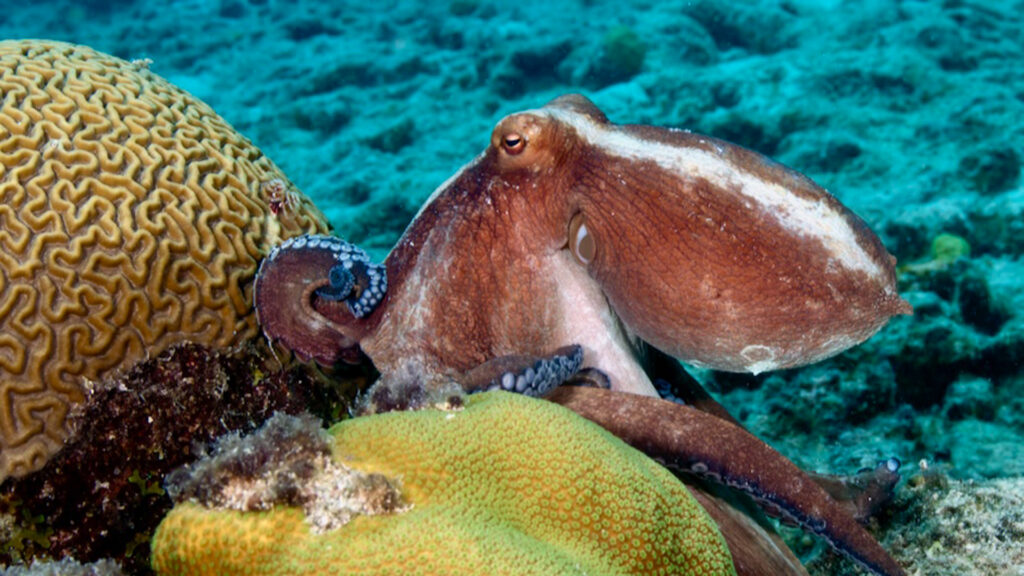By Diana Udel, University of Miami News
In a significant move toward marine conservation, the Congress is considering the OCTOPUS Act, a federal law that aims to ban commercial octopus farming in the United States. The bill would also prohibit the importation of octopus products from farms abroad. The legislative effort was initiated as a growing global concern over the ethical and environmental implications of octopus farming has sparked debates among scientists, conservationists and policymakers.
Jennifer Jacquet, a professor in the Department of Environmental Science and Policy at the University of Miami Rosenstiel School of Marine, Atmospheric, and Earth Science, co-authored a letter published in the Aug.15 issue of Science that explains why the OCTOPUS Act should be enacted into law, and is signed by 100 concerned scholars signifying their support.
Octopuses, particularly Octopus vulgaris, the species that gained worldwide attention through the documentary “My Octopus Teacher,” are renowned for their intelligence and complex behavior. These marine invertebrates possess a large, distributed nervous system, can use tools and can even walk on two arms. Octopuses are considered a keystone species in coastal and reef environments, helping to maintain a healthy balance of the ecosystem.
“Given the sophisticated nature of the octopus, it makes them particularly unsuited for life in captivity, where the controlled, confining and sterile environments of commercial farms would likely cause severe stress and behavioral issues,” said Jacquet. “They are not an ideal aquatic species for farming and need to remain as wild animals in the ocean.”

Currently, there are no commercial octopus farms in operation, but a Spanish seafood company has plans to build the first of its kind octopus farm in the Canary Islands, which prompted the state of Washington to ban octopus farming. Similar legislation is being introduced in California and Hawaii.
The authors state that the federal government’s involvement through the OCTOPUS Act underscores the seriousness of the issue and reflects a broader commitment to marine conservation.
Research has shown that octopuses are carnivorous and have complex dietary needs that would be challenging and expensive to meet in farming production. They are solitary and prefer live prey such as crabs and squid, adding concerns that farmed octopus would accept the byproducts or discards from other fisheries. This dietary preference not only raises ethical concerns about the welfare of farmed octopus but also threatens to increase pressure on wild fish stocks.
The motivation behind octopus farming is primarily driven by the increasing demand for exotic meats from luxury markets. Jacquet and her co-authors argue that satisfying such markets does not justify the significant risks posed to animal welfare and the environment.
Sustainable commercial farming of octopus has been deemed “currently impossible” by aquaculture experts, making the case for the OCTOPUS Act even more compelling. Commercial octopus farming has been attempted over the last 10 years but has failed due to the high cost and very low yield associated with their production.
“Octopus is not a viable species for farming. Over the last decades, many have tried and have failed due to the complexities and characteristics of the species,” said Daniel Benetti, professor of marine biology and ecology, and director of the Aquaculture Program at the Rosenstiel School. “They are solitary animals, so even if they could be raised experimentally, the cost of infrastructure, technology, and production would be prohibitive. This proposed legislation is a good thing. Not only will it protect octopuses, but it will save potential investors time and money by not investing in a sure way to lose a lot of money.”
If passed, the OCTOPUS Act would represent a significant victory for marine conservation in the United States, setting a precedent for other nations to follow. It would prevent the establishment of an industry that could irreversibly harm one of the ocean’s most fascinating invertebrates and disrupt delicate marine ecosystems.
Congress is expected to vote on the OCTOPUS Act later this year. If successful, it could signal the beginning of a new era in marine conservation that prioritizes the welfare of marine animals and the health of the oceans over the demands of luxury markets.
This piece was originally published at https://news.miami.edu/rosenstiel/stories/2024/08/the-octopus-act-a-push-to-protect-octopuses-from-the-dangers-of-commercial-farming.html.
Sign up for The Invading Sea newsletter by visiting here. If you are interested in submitting an opinion piece to The Invading Sea, email Editor Nathan Crabbe at ncrabbe@fau.edu.



